Key takeaways:
- Failures in healthcare education can reveal systemic issues and contribute to personal growth when approached with a constructive mindset.
- Embracing setbacks as learning opportunities fosters resilience and adaptability, essential traits for healthcare professionals.
- Effective communication and collaboration are crucial in group settings, as misunderstanding roles can lead to chaos and frustration.
- Building a supportive environment to share experiences with failures encourages collective learning and reduces the fear of making mistakes.
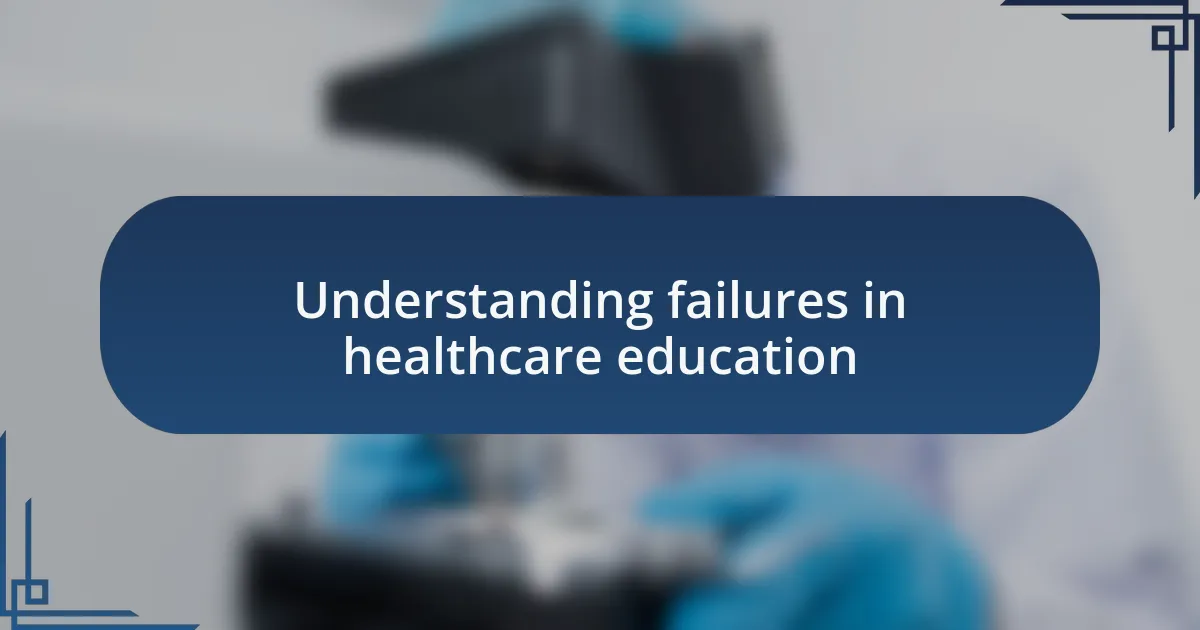
Understanding failures in healthcare education
Failures in healthcare education often reveal deeper systemic issues that require attention. I remember a particularly eye-opening experience during my training when a patient’s adverse reaction to a treatment highlighted gaps in my understanding and preparation. It made me wonder: how can we create an environment where such pivotal lessons are embraced rather than stigmatized?
Reflecting on the common fear of failure in education, I’ve seen firsthand how it can stifle innovation and critical thinking. A classmate once hesitated to present their findings because they believed a minor error would lead to ridicule. This experience made me realize that each misstep could serve as a stepping stone, rather than a stumbling block, fostering resilience and adaptability.
When we discuss failures in healthcare education, it’s essential to acknowledge the emotional toll they can take on learners. Personally, I felt a mix of embarrassment and frustration during an assessment where I misunderstood essential concepts. This could lead one to ask: how can we transform these moments of vulnerability into powerful teaching tools that ultimately enhance our understanding and effectiveness as future healthcare professionals?
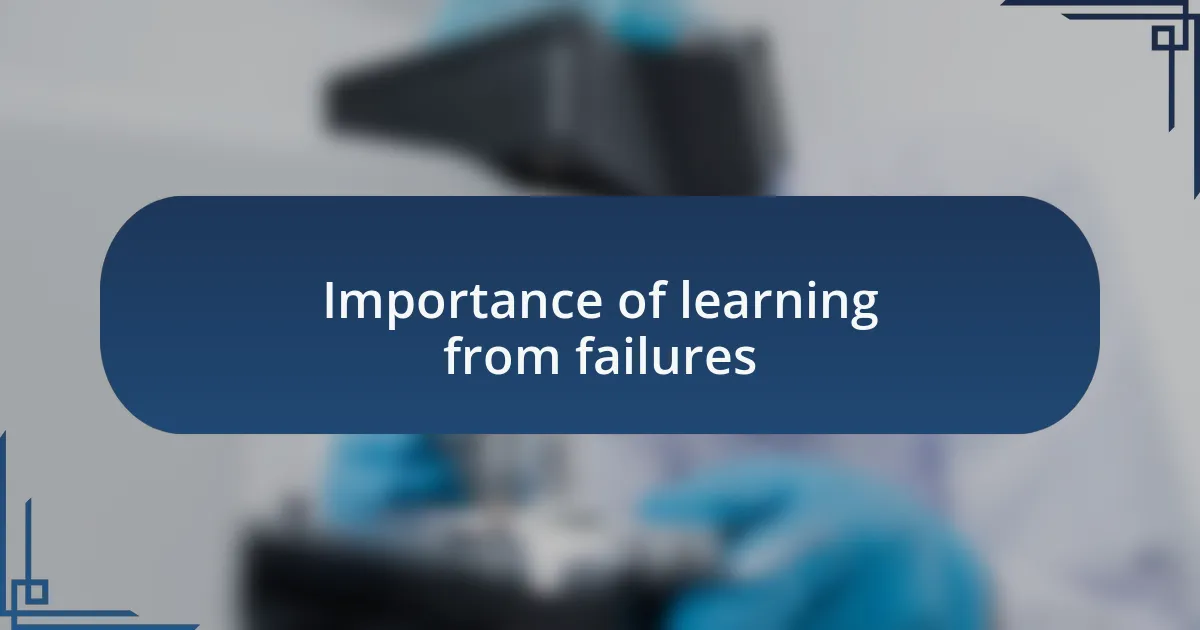
Importance of learning from failures
Learning from failures is crucial, especially in the realm of healthcare education. I recall a time when I misinterpreted patient data during a simulation exercise, which resulted in a flawed treatment plan. Instead of feeling defeated, I took it as an invaluable lesson. It pushed me to dig deeper into data interpretation, highlighting how failures can sharpen our skills when approached with the right mindset.
Moreover, the fear of making mistakes can lead to a culture of silence around failures. I remember a group discussion where one of my peers finally shared their experience of miscommunicating with a patient. Their hesitation to speak up initially showed just how stifling this fear can be. Sharing these experiences openly can create a supportive learning environment where we learn collectively from our mistakes, turning those moments into learning opportunities.
Each failure presents an opportunity for growth and introspection. I once faced a failed group project due to poor collaboration, and while it was disheartening, it sparked a deep reflection on effective communication and teamwork. This experience not only taught me the importance of clear dialogue but also reinforced my belief that embracing our failures can lead us to become better healthcare professionals, ensuring we serve our patients more effectively in the future.
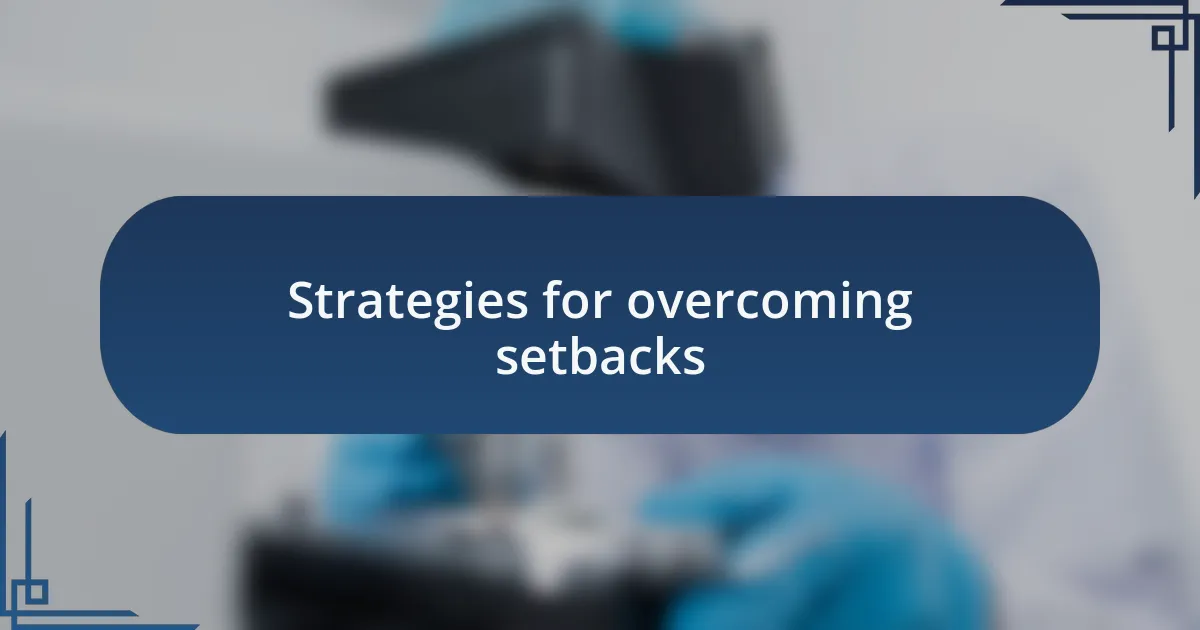
Strategies for overcoming setbacks
One effective strategy I’ve found for overcoming setbacks is to break down the experience into manageable parts. When I once faced a challenging situation in clinical practice, rather than getting overwhelmed, I focused on identifying specific elements that went wrong. This not only made the failure less daunting but also allowed me to pinpoint areas for improvement, turning frustration into actionable steps forward.
Another potent technique involves seeking feedback from peers or mentors. I remember after a particularly rough presentation on patient care strategies, a colleague offered insightful criticism that I hadn’t considered. At first, it stung, but their perspective became a catalyst for growth. How often do we shy away from feedback? Embracing constructive criticism can be incredibly liberating and ultimately enhance our learning journey.
Lastly, practicing self-compassion can transform how we view setbacks. I’ve had moments where I was my harshest critic, dwelling on perceived failures. Instead, I learned to treat myself with the same kindness I would offer a friend facing difficulties. This shift not only eased my emotional burdens but also opened up space for real reflection and growth. Isn’t it fascinating how a little kindness toward ourselves can reinvigorate our passion for learning?
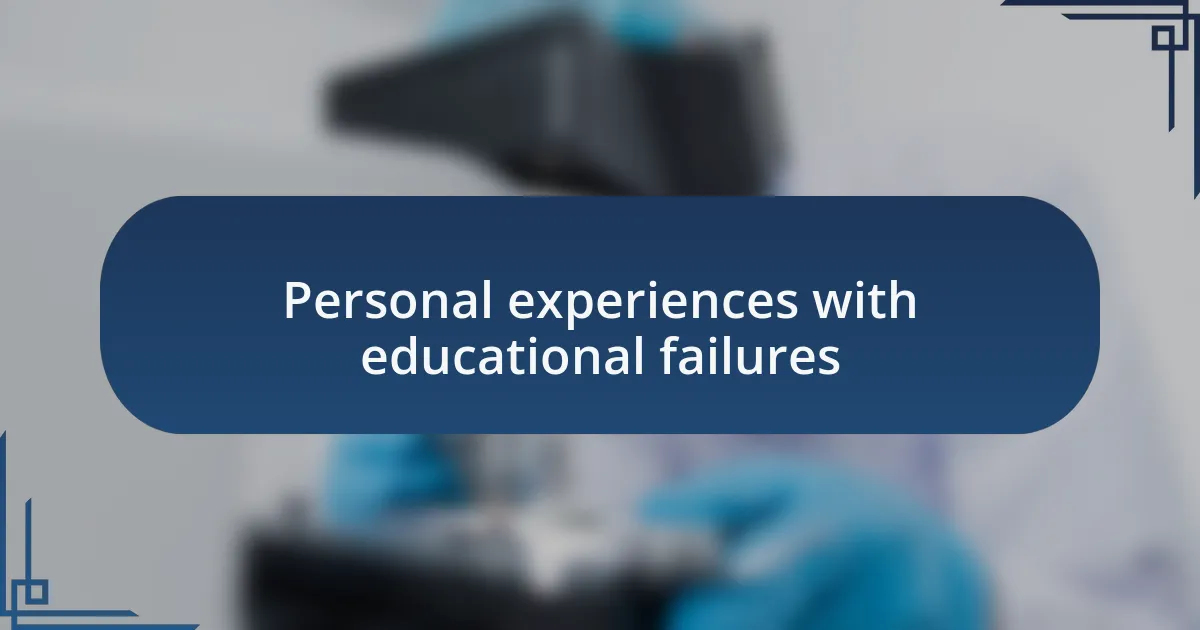
Personal experiences with educational failures
Reflecting on my own educational failures, I recall a time in nursing school when I completely mismanaged my time for a critical exam. The panic of realizing I hadn’t studied effectively left me feeling defeated. I can still feel that knot in my stomach when I think about how I had to face my classmates after the grades were posted. What I learned from that experience was monumental; I gained better time management skills and discovered the importance of asking for help when I needed it.
There was also an instance during a group project. I had mistakenly assumed everyone would contribute equally, and when the deadline approached, it became clear that some team members were overwhelmed, leading to last-minute chaos. I remember feeling frustrated and helpless; it was a wake-up call. This experience taught me that collaboration involves more than just dividing tasks. It requires communication and accountability. Since then, I’ve made it a point to establish clear expectations upfront, turning what could have been a disaster into a lesson on teamwork.
Another personal failure occurred during my internship, where I struggled to connect with a patient, ultimately failing to meet their needs appropriately. The weight of that realization was heavy. I’d always imagined myself as empathetic, but this experience forced me to confront my limitations. Have you ever felt that gut-wrenching moment when you realize you’re not meeting your own expectations? It spurred me to dive deeper into understanding patient-centered care, ensuring that such a disconnection wouldn’t happen again. The journey from failure to insight can be painful, but it has also been transformative.
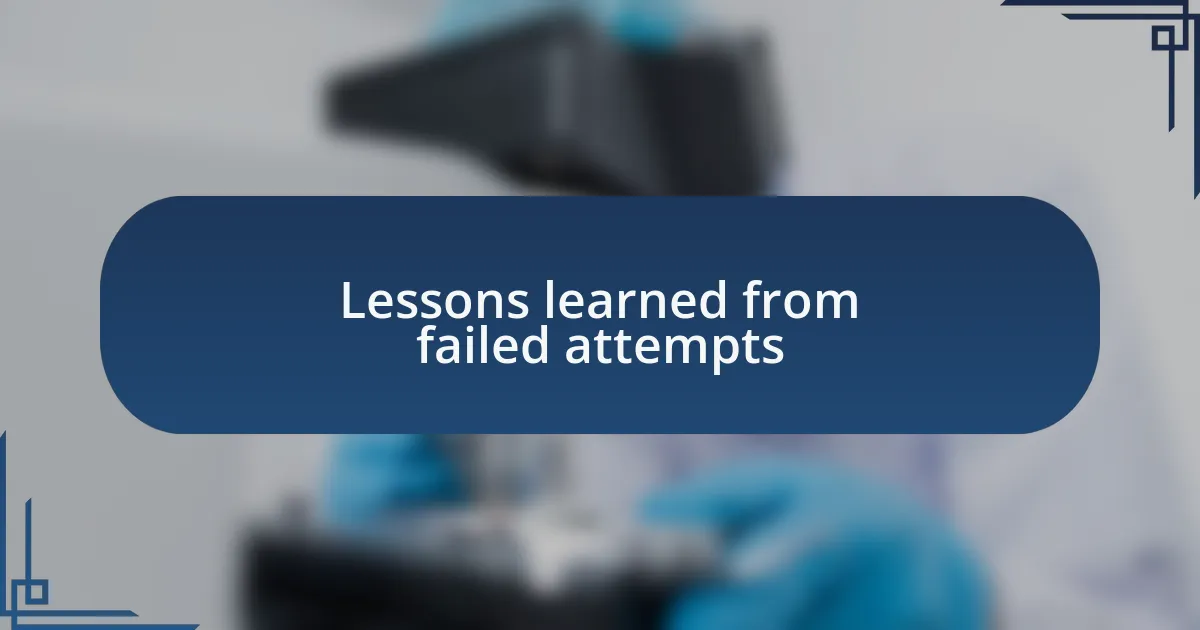
Lessons learned from failed attempts
Looking back, I remember a failed attempt at a practical skills exam that left me feeling humiliated. I had practiced extensively but still stumbled on key techniques. That moment taught me a crucial lesson: practice does not always guarantee success. Sometimes, it’s about the ability to adapt and think on your feet. Have you ever felt the pressure of performing under scrutiny? It’s in those moments that I learned resilience and the value of maintaining composure, even when things go wrong.
There was another instance when I hesitated to speak up during a simulation where a patient’s condition deteriorated. I thought I didn’t know enough to contribute effectively. The experience was eye-opening; it highlighted my fear of inadequacy, which nearly cost us the scenario. I realized that stepping out of my comfort zone is essential, and that voicing concerns—even if they may seem trivial—can lead to better outcomes. Have you ever held back in a critical situation? This taught me that confidence comes from experience, and every voice counts in a healthcare setting.
In a different educational scenario, I collaborated on a research project that ultimately failed to meet the deadline. I was filled with frustration, feeling that our group effort had been wasted. However, instead of wallowing in disappointment, I took a step back to analyze our workflow. The experience illuminated the importance of keeping all members engaged and accountable. It made me question how I could have encouraged a more proactive environment. In hindsight, this failure wasn’t just a setback; it was a powerful reminder that adaptability and open dialogue are crucial in any educational journey.
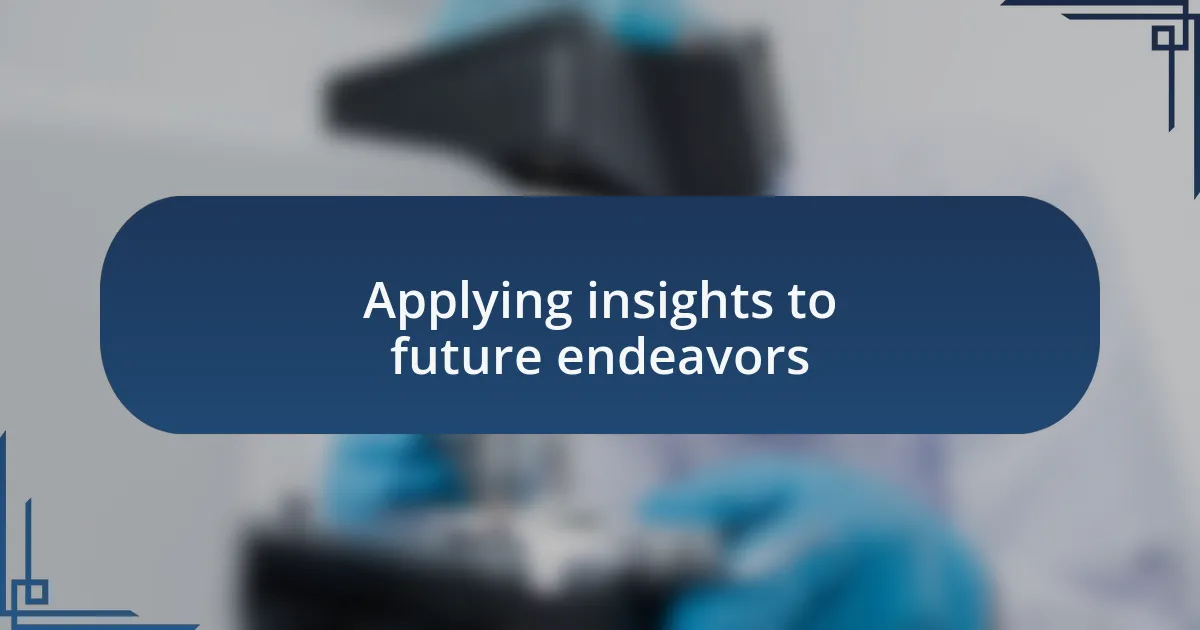
Applying insights to future endeavors
Reflecting on my past failures has illuminated several key insights that shape my approach to future endeavors. For instance, during a group project, I noticed that each member had their unique strengths but often worked in silos. This taught me the significance of fostering collaboration and creating an environment where everyone feels empowered to share ideas. Have you ever experienced the disconnect that can stem from poor communication? I’ve learned that a cohesive team dynamic can turn challenges into opportunities.
One particular instance stands out where I mismanaged my time leading up to an important presentation. I remember the dread as I faced an audience filled with experts, knowing I hadn’t prepared adequately. The experience stung, but it also drove me to implement strict time management strategies moving forward. This taught me that failing to plan can complicate even the simplest tasks. How do you prioritize when faced with multiple responsibilities? For me, establishing a clear timeline has become essential to navigating my educational and professional landscape.
As I ventured into clinical placements, I stumbled through a few interactions with patients that felt awkward and unprofessional. It was tough to accept, but each encounter taught me invaluable lessons about empathy and active listening. How do you connect with patients amid the pressures of clinical practice? I realized that being present and genuinely engaging with those I serve not only enhances patient care but also builds my confidence and skill. These reflections remind me that every misstep carries the seeds of improvement, each guiding me closer to becoming a better healthcare professional.
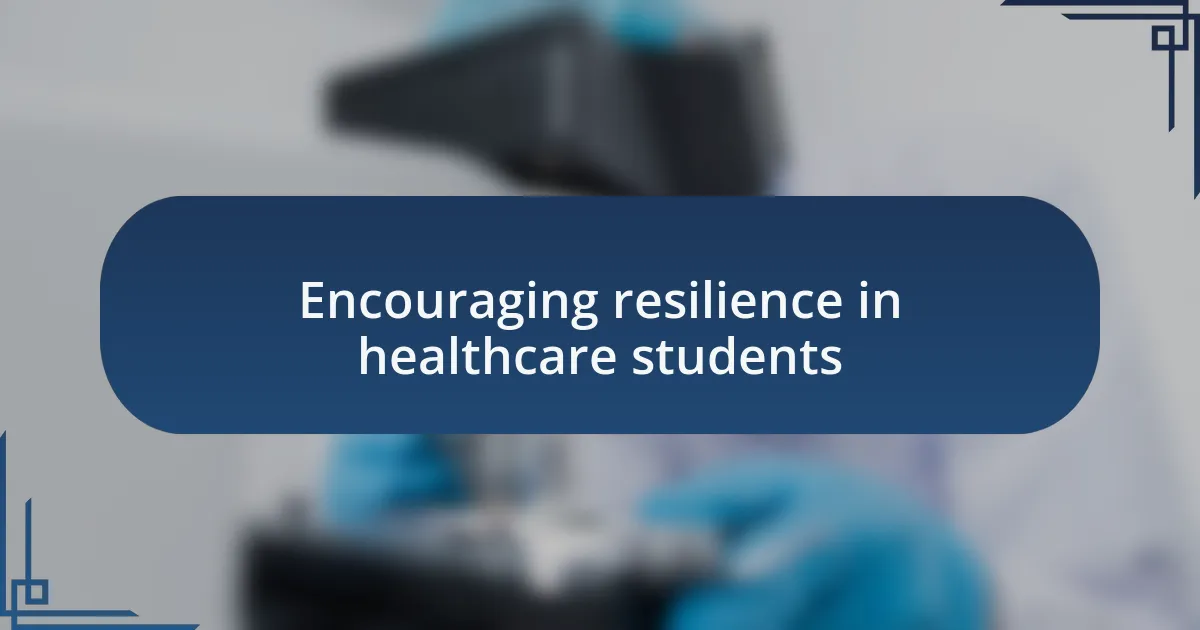
Encouraging resilience in healthcare students
Recognizing the importance of resilience in healthcare education, I recall a particularly challenging semester where my grades faltered. Each exam felt like a mountain I couldn’t climb. Instead of succumbing to discouragement, I sought support from peers and mentors, discovering that vulnerability is not a weakness but a stepping stone to growth. Have you ever found strength in asking for help? It was a game changer for me, reinforcing the idea that resilience often stems from community and connection.
During my clinical rotations, I faced not only demanding cases but also the emotional weight of patient struggles. I remember dealing with a patient whose prognosis was grim. In those moments, instead of turning away, I learned to face my discomfort and be present, embracing the tough emotions it brought. It’s incredible how such experiences cultivate resilience. Can you tap into your emotional reserves in challenging times? For me, leaning into those feelings helped build a mental fortitude that I didn’t know I had.
There were days I felt overwhelmed, convinced that I might not be cut out for healthcare. Yet, each failure became a lesson learned, fostering a mindset of perseverance. I’d write affirmations each night to reinforce my purpose and commitment, which became an anchor during stormy days. How do you keep yourself motivated when the going gets tough? Finding personal strategies, like reflective journaling, has been instrumental in building my resilience, allowing me to navigate the complexities of this rewarding field with confidence.